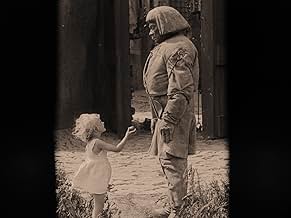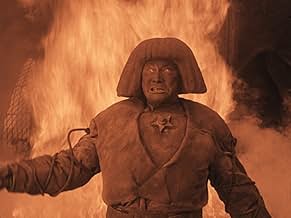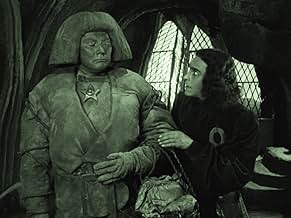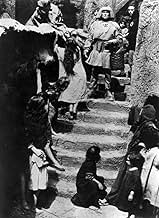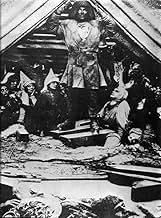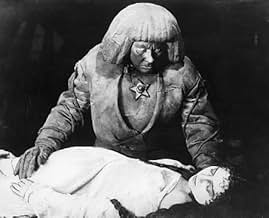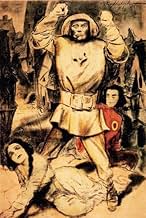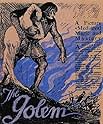ÉVALUATION IMDb
7,2/10
8,9 k
MA NOTE
Au 16e siècle, à Prague, un rabbin crée le Golem, une créature géante faite d'argile. Grâce à la sorcellerie, il donne vie à la créature afin de protéger les Juifs de Prague des persécutions... Tout lireAu 16e siècle, à Prague, un rabbin crée le Golem, une créature géante faite d'argile. Grâce à la sorcellerie, il donne vie à la créature afin de protéger les Juifs de Prague des persécutions.Au 16e siècle, à Prague, un rabbin crée le Golem, une créature géante faite d'argile. Grâce à la sorcellerie, il donne vie à la créature afin de protéger les Juifs de Prague des persécutions.
- Prix
- 1 victoire et 1 nomination au total
Hans Stürm
- Der Rabbi Jehuda, der Älteste der Gemeinde
- (as Hanns Sturm)
Carl Ebert
- Temple Servant
- (uncredited)
Fritz Feld
- Jester
- (uncredited)
Ursula Nest
- Little Girl
- (uncredited)
Histoire
Le saviez-vous
- Anecdotes"Aemaet", the life-giving word which Rabbi Lowe compels from the spirit Astaroth is also reflected in the bolts of lightning at the end of the creation scene.
- GaffesThe story is set in the 16th Century. A prediction of doom is made based on the movements of Uranus, which was not discovered until 1781.
- Autres versionsThe 2002 Alpha Video DVD version runs for 101 minutes. This is not evident from the back of the Alpha Video DVD case, which wrongly lists the running time as only 85 minutes. It looks as if Alpha Video somehow got hold of the fullest version currently known - maybe even a complete version of the film, since there are no obvious gaps in the story.
- ConnexionsEdited into People Who Die Mysteriously in Their Sleep (2004)
Commentaire en vedette
The giant frame of Paul Wegener as the Golem is one of the best known characters from the silent era, and one of the first icons of horror. Der Golem is actually the third film to feature the character, the first being The Golem (1915), and the second The Golem And The Dancing Girl (1917), which is a short comedy with Wegener donning the costume to frighten a girl he is in love with. Tragically, those two films are now considered lost, and only fragments equalling about 14 minutes of the first film remain. This film is actually a prequel, and it's full title is Der Golem: Wie Er In Die Welt Kam (How He Came Into The World), but is now commonly know as simply Der Golem.
The Jews of medieval Prague face persecution from the townsfolk. Terrified of their doomed fate, Rabbi Loew (Albert Steinruck) uses his skills in black magic to create The Golem, a mythical figure from Jewish folklore. He is made entirely from clay, and has an amulet in his chest that gives him power, and when removed turns him back into lifeless clay. He is initially used as a servant, and then to terrify the townsfolk who are threatening them. The Golem eventually gets tired of being used as a tool of fear and begins to turn on his creator, and starts to lay waste to the Ghetto.
Like the majority of films made in Weimar Germany, the film has an expressionist tone, with lavish, artistic sets that dominate the frame. Similar in feel to the great Das Cabinet Des Dr. Caligari, it is however more subtle in its artistic flair, and lacks Caligari's rickety (although wonderful in its own way) sets. It is also quite terrifying in its realisation of a segregation that would occur in the country only a decade later, although it does portray the Jews as vengeful and as studying the dark arts.
The Golem itself is a great movie monster. Tragic in the same way as Frankenstein's monster, he is brought into the world without having asked to be, and is expected to carry out terrible acts against his will. Paul Wagener portrays him with all silent intensity and uncontrollable rage, with his towering frame sending his enemies running for the hills. He also impressively co-wrote and co-directed the film. This is an enjoyable film that breezes by in its rather slight running time, and can be forgiven for some over-acting and the occasional tedious scene. It also has some interesting social comments, and is a frightening prelude to one of the most horrific periods in Europe's history.
www.the-wrath-of-blog.blogspot.com
The Jews of medieval Prague face persecution from the townsfolk. Terrified of their doomed fate, Rabbi Loew (Albert Steinruck) uses his skills in black magic to create The Golem, a mythical figure from Jewish folklore. He is made entirely from clay, and has an amulet in his chest that gives him power, and when removed turns him back into lifeless clay. He is initially used as a servant, and then to terrify the townsfolk who are threatening them. The Golem eventually gets tired of being used as a tool of fear and begins to turn on his creator, and starts to lay waste to the Ghetto.
Like the majority of films made in Weimar Germany, the film has an expressionist tone, with lavish, artistic sets that dominate the frame. Similar in feel to the great Das Cabinet Des Dr. Caligari, it is however more subtle in its artistic flair, and lacks Caligari's rickety (although wonderful in its own way) sets. It is also quite terrifying in its realisation of a segregation that would occur in the country only a decade later, although it does portray the Jews as vengeful and as studying the dark arts.
The Golem itself is a great movie monster. Tragic in the same way as Frankenstein's monster, he is brought into the world without having asked to be, and is expected to carry out terrible acts against his will. Paul Wagener portrays him with all silent intensity and uncontrollable rage, with his towering frame sending his enemies running for the hills. He also impressively co-wrote and co-directed the film. This is an enjoyable film that breezes by in its rather slight running time, and can be forgiven for some over-acting and the occasional tedious scene. It also has some interesting social comments, and is a frightening prelude to one of the most horrific periods in Europe's history.
www.the-wrath-of-blog.blogspot.com
- tomgillespie2002
- 8 juin 2011
- Lien permanent
Meilleurs choix
Connectez-vous pour évaluer et surveiller les recommandations personnalisées
- How long is The Golem?Propulsé par Alexa
Détails
- Durée1 heure 16 minutes
- Couleur
- Mixage
- Rapport de forme
- 1.33 : 1
Contribuer à cette page
Suggérer une modification ou ajouter du contenu manquant



